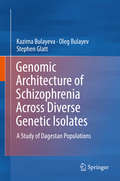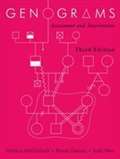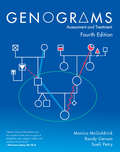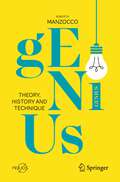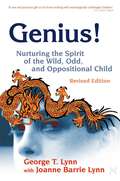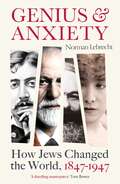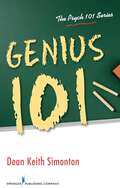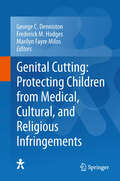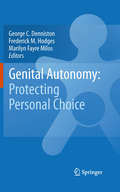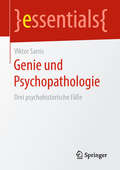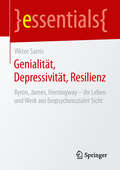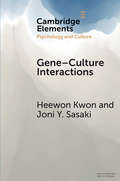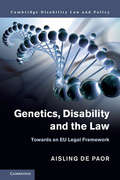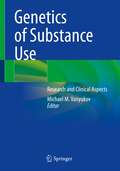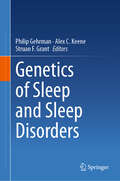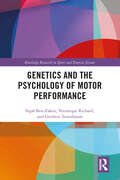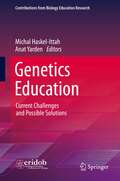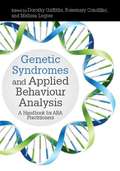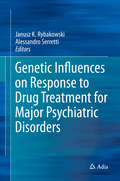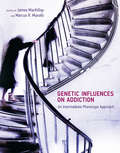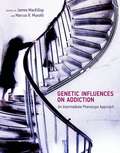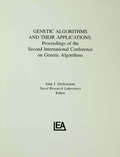- Table View
- List View
Genomic Architecture of Schizophrenia Across Diverse Genetic Isolates
by Kazima Bulayeva Oleg Bulayev Stephen GlattThis book presents a long-term study in genetic isolates of indigenous small ethnics of Dagestan, located in the North-East part of Caucasus in Russia. Dagestan is characterized by extreme cultural and linguistic differences in a small geographic area and contains 26 indigenous ethnic groups. According to archeological data these indigenous highland ethnics have been living in the same area for more than ten thousand years. Our long-term population-genetic study of Dagestan indigenous ethnic groups indicates their close relation to each other and suggests that they evolved from one common ancestral meta-population . Dagestan has an extremely high genetic diversity between ethnic populations and a low genetic diversity within them. Such genetic isolates are exceptional resources for the detection of susceptibility genes for complex diseases because of the reduction in genetic and clinical heterogeneity. The founder effect and gene drift in these primary isolates may have caused aggregation of specific haplotypes with limited numbers of pathogenic alleles and loci in some isolates relative to others. The book presents a study in four ethnically and demographically diverse genetic isolates with aggregation of schizophrenia that we ascertained within our Dagestan Genetic Heritage Research Project. The results obtained support the notion that mapping genes of any complex disease (e. g. , schizophrenia) in demographically older genetic isolates may be more time and cost effective due to their high clinical and genetic homogeneity, in comparison with demographically younger isolates, especially with genetically heterogeneous outbred populations.
Genograms: Assessment and Intervention (3rd edition)
by Monica Mcgoldrick Randy Gerson Sueli PetryWidely used by both family therapists and health care professionals, the genogram is a graphic way of organizing the mass of information gathered during a family assessment and finding patterns in the family system for more targeted treatment. McGoldrick (director, Multicultural Family Institute) explains how to construct a genogram, do a genogram interview, and interpret the results. Genograms of famous families such as the Kennedys, the Fondas, the Freuds, and the Jungs, bring the text to life and help elucidate the principles of family systems theory and systemic interviewing, which form the basis of genogram work. This third edition is updated and expanded. It includes a new color insert and new material on the clinical applications of genograms.
Genograms: Assessment And Treatment
by Randy Gerson Sueli Petry Monica McGoldrickThe latest edition of this definitive book in the field of family therapy—the first update in ten years. Widely used by family therapists— and by health care professionals in general—the genogram is a graphic way of organizing the mass of information gathered during a family assessment. This visual representation allows the practitioner to find patterns in the family system for more targeted treatment. Now in its fourth edition, Genograms has been fully updated by renowned therapist Monica McGoldrick. Expanded with four-color images throughout, additional material explaining the use of genograms with siblings and couples, and a thorough updating to essential concepts, this edition provides a fascinating view into the richness of family dynamics. Informative, comprehensive, and beautifully written and illustrated, this book helps bring to life principles of family system theory and systemic interviewing, as well as walk readers through the basics of constructing a genogram, doing a genogram interview, and interpreting the results.
Genocide and Mass Violence
by Devon E. Hinton Alexander L. HintonWhat are the legacies of genocide and mass violence for individuals and the social worlds in which they live, and what are the local processes of recovery? Genocide and Mass Violence aims to examine, from a cross-cultural perspective, the effects of mass trauma on multiple levels of a group or society and the recovery processes and sources of resilience. How do particular individuals recall the trauma? How do ongoing reconciliation processes and collective representations of the trauma impact the group? How does the trauma persist in 'symptoms'? How are the effects of trauma transmitted across generations in memories, rituals, symptoms, and interpersonal processes? What are local healing resources that aid recovery? To address these issues, this book brings into conversation psychological and medical anthropologists, psychiatrists, psychologists and historians. The theoretical implications of the chapters are examined in detail using several analytic frameworks.
Genius: Theory, History and Technique (Springer Praxis Books)
by Roberto ManzoccoGenius is a fascinating topic. Everyone has an opinion on it, but not a lot of clarity. Much has been written on the subject - biographies, autobiographies, technical books, popular science books, and practical manuals - but genius in all of its dimensions has yet to be addressed. This book seeks to remedy that. What follows is a work of significant breadth that hopes to facilitate a nuanced popular understanding of the definition of genius, examining all of the main theories and approaches regarding the nature and origin of brilliance, the cognitive path that geniuses follow, and the difference that exists between “geniuses” on one side and “normal people” on the other. Pragmatic indications surrounding this issue are also examined, regarding such questions as: is it possible to become a genius or is genius innate? If it is possible, what is the path – no doubt long and difficult – that one must take? Is there a method for becoming a genius that can be taught and learned? This book will appeal to anyone who has ever contemplated great ideas and works and wondered how they came into being.
Genius!: Nurturing the Spirit of the Wild, Odd, and Oppositional Child – Revised Edition
by George LynnGenius! is an inspiring guide to nurturing the remarkable abilities of "attention different" (AD) children diagnosed with conditions such as autism, Asperger Syndrome, AD/HD, bipolar disorder, or Tourette Syndrome (TS). Drawing on their experiences with their own son, who has TS, George T. Lynn and Joanne Barrie Lynn offer a positive parenting philosophy and successful strategies for creating an affirmative social and emotional environment that unlocks the potential genius in 'neurologically eccentric' children. The authors emphasize the importance of identifying the signs of giftedness, providing the necessary care and mentoring, and using medication with due consideration of its benefits and limitations. They also acknowledge the need to confront the `dark side' of atypical neurology - obsessiveness, self-centredness and hyperactivity - and offer helpful advice on ensuring parents' and carers' own emotional, spiritual, and physical well-being. This book will be an essential tool for parents and carers to help bring out the best in their AD child and help him explore his full potential in life. This revised edition also includes additional material on working with older age groups.
Genius and Anxiety: How Jews Changed the World, 1847–1947
by Norman LebrechtMarx, Freud, Proust, Einstein, Bernhardt and Kafka. Between the middle of the nineteenth and twentieth centuries a few dozen men and women changed the way we see the world. But many have vanished from our collective memory despite their enduring importance in our daily lives. Without Karl Landsteiner, for instance, there would be no blood transfusions or major surgery. Without Paul Ehrlich no chemotherapy. Without Siegfried Marcus no motor car. Without Rosalind Franklin genetic science would look very different. Without Fritz Haber there would not be enough food to sustain life on earth. These visionaries all have something in common – their Jewish origins and a gift for thinking outside the box. In 1847 the Jewish people made up less than 0.25% of the world&’s population, and yet they saw what others could not. How?
Genius 101 (Springer Ser.)
by Dean Keith SimontonGenius," contrary to common belief, is not strictly a matter of intelligence. Intellect, personality, creativity, even serendipity play a significant role in molding a genius. So, what does it mean to be a genius? Genius 101 examines the many definitions of "genius," and the multiple domains in which it appears, including art, science, music, business, literature, and the media. Dr. Simonton introduces the study of genius theory and the research supporting it, using non-scientific, accessible language-fit for a non-genius.
Genitori Single e Loro Figli: Le Buone Notizie Che Nessuno Mai Ti Dice
by Bella Depaulo Valentina StaffieriGenitori Single e Loro Figli: Le Buone Notizie che Nessuno Mai Ti Dice di Bella DePaulo Un libro di buone notizie sui figli di genitori single, basato sulla ricerca scientifica "Genitori Single e Loro Figli" è una raccolta di articoli che fanno cadere i miti, che accrescono la consapevolezza che sfida tutti gli stereotipi che diminuiscono e degradano le famiglie monoparentali. Attingendo alle ricerche scientifiche, la Dr.ssa Bella DePaulo dimostra che le fosche previsioni sul destino dei figli di genitori single sono grossolanamente esagerate o semplicemente sbagliate. Inoltre, ci sono modi in cui i figli di genitori single se la cavano meglio di chiunque altro. Le Buone Notizie che Nessuno Mai Ti Dice. La professoressa DePaulo è stata descritta dalla rivista Atlantic come "la più importante pensatrice e scrittrice americana sull'esperienza del single." Questo libro contiene più di una dozzina dei suoi scritti più influenti sui genitori single e i loro figli, oltre a diversi contributi di ospiti. Gli articoli di Bella DePaulo originariamente sono apparsi nel suo popolare blog "Living Single" in Psychology Today e il suo blog "Single at Heart" a PsychCentral, così come sul Guardian.
Genital Cutting: Protecting Children from Medical, Cultural, and Religious Infringements
by Frederick M. Hodges Marilyn Fayre Milos George C. DennistonThis volume contains the proceedings of the 10th International Symposium on Circumcision, Genital Integrity, and Human Rights. Authors are international experts in their fields, and the book contains the most up-to-date information on the issue of genital cutting of infants and children from medical, legal, bioethical, and human rights perspectives.
Genital Autonomy:
by Frederick M. Hodges Marilyn Fayre Milos George C. DennistonCircumcision affects 15.3 million children and young adults annually. In terms of gender, 13.3 million boys and 2 million girls are subjected to the involuntary removal of part or all of their external sexual organs every year. The problem of female circumcision has been addressed on an international level, but male circumcision remains a controversial subject that many academics have been reluctant to examine. Circumcision is tolerated today because it has been practiced for millennia by a small but vocal minority of religious and ethnic groups, however, when the practice is examined through the lens of modern legal, ethical, and human rights advancements, no place remains in civilized society for this body-altering ritual. In Genital Autonomy: Protecting Personal Choice, international experts address various types of genital modifications, the impact of these harmful traditional practices on the child, on human rights, and on the development of the concept of bodily integrity. The papers presented in this volume address these topics from a variety of angles. They question and dissects the true motivations of the doctors, witch doctors, and "holy men" who promote and profit from circumcision.
Genie und Psychopathologie: Drei psychohistorische Fälle (essentials)
by Viktor SarrisDieses essential behandelt die psychischen Erkrankungen von Robert Schumann, Vincent van Gogh und Virginia Woolf - diesen Genialen der Musik, Malerei und Literatur - aus psychohistorischer Sicht. Es stellt die Frage, wie diese drei gro#65533;en Pers#65533;nlichkeiten mit ihren schweren Depressionen umgegangen sind. Ihr Schicksal ist neben der klinisch-medizinischen Seite auch unter einem psychologischen und anthropologischen Blickwinkel von Interesse. Das Thema wird im Rahmen eines biopsychosozialen Modells im Zusammenhang mit der sogenannten Mad-Genius-Hypothese behandelt. Dabei steht die zu beachtende Problematik einer Stigmatisierung und gesellschaftlichen Ausgrenzung von Genialen und psychisch Labilen bzw. Kranken ebenfalls im Raum.
Genialität, Depressivität, Resilienz: Byron, James, Hemingway – ihr Leben und Werk aus biopsychosozialer Sicht
by Viktor SarrisDieses essential behandelt die psychischen Erkrankungen von Lord George Byron, William James und Ernest Hemingway – drei genialen Persönlichkeiten der Poesie, Wissenschaft und Literatur. Es wird untersucht, wie diese Genies mit ihrer schweren Depressivität zeit ihres Lebens umgegangen sind. Dabei interessiert besonders die Frage, welche psychischen Widerstände sie gegen ihre Depressionen mobilisieren konnten (Resilienz). Ihr persönliches Schicksal wird jeweils unter einem biopsychosozialen Blickwinkel der Möglichkeiten und Grenzen ihrer kognitiv-emotionalen Abwehrkräfte behandelt. Damit wird auch die Frage berührt, welche Bedeutung die Resilienz für die Kontrolle von Suizidalität hat.
Gene–Culture Interactions: Toward an Explanatory Framework (Elements in Psychology and Culture)
by Joni Y. Sasaki Heewon KwonExamining the interconnections between genes and culture is crucial for a more complete understanding of psychological processes. Genetic predispositions may predict different outcomes depending on one's cultural context, and culture may predict different outcomes depending on genetic predispositions - that is, genes and culture interact. Less is understood, however, about how genes and culture interact, or the psychological mechanisms through which gene–culture interactions occur. In this Element, Joni Y. Sasaki and Heewon Kwon review key findings and theories in gene–culture interaction research. They then go on to discuss current issues and future directions in gene–culture research that may illuminate the path toward an explanatory framework.
Genetics, Disability and the Law: Towards an EU Legal Framework (Cambridge Disability Law and Policy Series)
by Aisling De PaorWhile advances in science and technology bring many advantages, we must not ignore the harm that they can cause. Rapid changes in genetic testing are a prime example, and indicators can now help to detect, address and treat diseases. However, in this new study, Aisling de Paor examines how genetic testing is also being used for non-medical reasons, for example for work opportunities and insurance coverage. Genetics, Disability and the Law is the first book of its kind to substantively consider an EU-level response to the use of genetic information. de Paor discusses how to help genetic and scientific research to evolve and grow, how to enhance public confidence in research, and how to control it so that it recognises our values and fundamental human rights. An understudied but vitally important topic, de Paor's work provides a valuable and timely contribution to the field of disability rights. Presents a practical consideration of an EU-level legislative response to controlling the use and misuse of genetic information, appealing to those involved in the regulation of this field Takes a human rights and disability approach to considering the regulation of genetic information, which will interest scholars and policymakers from a variety of disciplines, in particular because it considers the intersection of disability and genetics Considers normative and non-normative attitudes to the regulation of genetic information, giving readers a new and varied insight
Genetics of Substance Use: Research and Clinical Aspects
by Michael M. VanyukovThe book illuminates the complex problems in genetic studies of substance use and addiction. It provides a comprehensive overview that fills the gap in the literature and points out future directions.The book includes three sections that apply to any complex traits and disorders, particularly psychological and psychiatric. The first section covers the traits and phenotypes that are the target of genetic research in substance use and addiction. Following this, the second section analyzes the methods and results of biometric genetic studies in this area. The third section reviews research in gene mapping and epigenetics. Genetics of Substance Use is a first-of-its-kind monograph that presents contemporary solutions and methods for a wide range of researchers and practitioners across disciplines.
Genetics of Sleep and Sleep Disorders
by Philip Gehrman Alex C. Keene Struan F. GrantThis book focuses on the latest research on the genetic basis of the regulation of sleep and wakefulness and of sleep and circadian rhythm disorders, which has been expanding rapidly due to advances in genetics. The book reviews the latest genetic discoveries in animals and humans and explores their implications for getting a good night's sleep. Philp Gehrman, Alex Keene, Struan Grant, and a cadre of top sleep researchers and clinicians explore the genetics of sleep and sleep disorders in depth. The book should appeal to sleep medicine specialists, psychiatrists, geneticists, and neuroscientists.
Genetics of Mental Disorders: What Practitioners and Students Need to Know
by Stephen V. Faraone Ming T. Tsuang Debby W. TangIntroduces ideas about inherited genetically based mental disorders and how they combine with environmental factors. thinks about mental disorders with insight.
Genetics and the Psychology of Motor Performance (Routledge Research in Sport and Exercise Science)
by Gershon Tenenbaum Sigal Ben-Zaken Véronique RichardDespite the prevalence of behavioral research conducted through genetic studies, there is an absence of literature pertaining to the genetics of motor behavior. Genetics and the Psychology of Motor Performance is the first book to integrate cutting-edge genetic research into the study of the psychological aspects of motor learning and control.The book’s central line of enquiry revolves around the extent to which psychological factors central to motor proficiency – including personality, emotion, self-regulation, motivation, and perceptual-cognitive skills – are acquired or inherited. It explains how these factors affect motor performance, distilling the latest research into their genetic underpinnings and, in doing so, assessing the magnitude of the role genetics plays in the stages of motor development, from early proficiency through to expertise.Written by leading experts in the genetics of human performance and exercise psychology, and thoroughly illustrated throughout, Genetics and the Psychology of Motor Performance is a crucial resource for any upper-level student or researcher seeking a deeper understanding of motor learning. It is an important book for anyone studying or working in exercise psychology, motor development, exercise genetics, or exercise physiology more broadly.
Genetics Education: Current Challenges and Possible Solutions (Contributions from Biology Education Research)
by Anat Yarden Michal Haskel-IttahThis edited volume presents the current state of the art of genetics education and the challenges it holds for teaching as well as for learning. It addresses topics such as how genetics should be taught in order to provide students with a wide and connected view of the field. It gives in-depth aspects that should be considered for teaching genetics and the effect on the student’s understanding. This book provides novel ideas for biology teachers, curriculum developers and researchers on how to confront the presented challenges in a way that may enable them to advance genetics education in the 21st century. It reviews the complexity of teaching and learning genetics, largely overlooked by biology textbooks and classroom instruction. It composes a crucial component of scientific literacy.
Genetic Syndromes and Applied Behaviour Analysis: A Handbook for ABA Practitioners
by Andrew Davis Sylvana Yeung Linda Moroz Dayna Taylor-Weir Jane Summers Shelley L. Watson Kerry Boyd Faten Matar Jeffery Hamelin Jennifer Tysick Lauren Ireland Emily Moxey Brenda Finucane Elliot Simon Barbara Haas-Givler Keeley White Sarah Ruiter Tali Amar Jan Frijters Joanna Cappuccitti Milena Kako Dorothy Griffiths Ami Morris Julie Krieger Carina Gratton Melissa Legree Rosemary Condillac Tracy Billingsley Diana Kondratenko Dalena Anzivino Anne Brennan Kristin BakerThis ground-breaking resource demonstrates how genetic knowledge can influence our understanding of a child's behaviour and therefore inform their behavioural support plan. With expert advice and clear instructions, it shows exactly how to go about incorporating syndrome knowledge into ABA practice and start treating children with specific genetic syndromes more effectively. Six different genetic syndromes are covered in detail, ranging from Angelman syndrome to Williams syndrome. The book also includes general sections on genetic intellectual disability syndromes and an explanation of ABA methodology. This will be an invaluable and enlightening book for ABA practitioners and other professionals supporting people with intellectual disabilities caused by a specific genetic syndrome from age 3 to young adult, providing the missing link between ABA and the role that genetics can play in accurate assessment and intervention.
Genetic Influences on Response to Drug Treatment for Major Psychiatric Disorders
by Janusz K. Rybakowski Alessandro SerrettiWritten by global experts, this book provides a modern comprehensive insight into the pharmacogenetics of treatment of major psychoses: schizophrenia, bipolar disorder and depression. The pharmacogenomics of three categories of the most important psychiatric drugs, antipsychotics, antidepressants and mood stabilizers, has been updated and reviewed. Some promising directions and perspectives for future research in pharmacogenetics in major psychoses are indicated. They are, among others, connected with the development of new methods in molecular genetics and with linking pharmacogenetics assessment with biomarkers, including neuroimaging ones. Finally, the attempts to use pharmacogenetics of antipsychotic, antidepressant and mood-stabilizing drugs in practice are presented. New pharmacogenetic tools may greatly contribute to introducing personalized medicine into psychiatric clinical practice.
Genetic Influences on Addiction: An Intermediate Phenotype Approach (The\mit Press Ser.)
by James MacKillopA comprehensive review of research examining intermediary mechanisms to understand the link between genetic variation and addiction liability.Although there is scientific consensus that genetic factors play a substantial role in an individual's vulnerability to drug or alcohol addiction, specific genetic variables linked to risk or resilience remain elusive. Understanding how genetic factors contribute to addiction may require focusing on intermediary mechanisms, or intermediate phenotypes, that connect genetic variation and risk for addiction. This book offers a comprehensive review of this mechanistic-centered approach and the most promising intermediate phenotypes identified in empirical research.The contributors first consider the most established findings in the field, including variability in drug metabolism, brain electrophysiological profiles, and subjective reactions to direct drug effects; they go on to review highly promising areas such as expectancies, attentional processing, and behavioral economic variables; and finally, they investigate more exploratory approaches, including the differential susceptibility hypothesis and epigenetic modifications. Taken together, the chapters offer a macro-level testing of the hypothesis that these alternative, mechanistic phenotypes can advance the understanding of genetic influences on addiction. The book will be of interest to researchers and practitioners in a range of disciplines, including behavioral genetics, psychology, pharmacology, neuroscience, and sociology.ContributorsJohn Acker, Steven R.H. Beach, Gene H. Brody, Angela D. Bryan, Megan J. Chenoweth, Danielle M. Dick, Eske D. Derks, Mary-Anne Enoch, Meg Gerrard, Frederick X. Gibbons, Thomas E. Gladwin, Mark S. Goldman, Marcus Heilig, Kent E. Hutchison, Hollis C. Karoly, Steven M. Kogan, Man Kit Lei, Susan Luczak, James MacKillop, Renee E. Magnan, Leah M. Mayo, Marcus R. Munafò, Daria Orlowska, Abraham A. Palmer, Danielle Pandika, Clarissa C. Parker, Robert A. Philibert, Lara A. Ray, Richard R. Reich, Ronald L. Simons, Courtney J. Stevens, Rachel E. Thayer, Rachel F. Tyndale, Tamara L. Wall, Reinout W. Wiers, Michael Windle, Harriet de Wit
Genetic Influences on Addiction
by James MackillopAlthough there is scientific consensus that genetic factors play a substantial rolein an individual's vulnerability to drug or alcohol addiction, specific genetic variables linked torisk or resilience remain elusive. Understanding how genetic factors contribute to addiction mayrequire focusing on intermediary mechanisms, or intermediate phenotypes, that connect geneticvariation and risk for addiction. This book offers a comprehensive review of thismechanistic-centered approach and the most promising intermediate phenotypes identified in empiricalresearch. The contributors first consider the most established findings in thefield, including variability in drug metabolism, brain electrophysiological profiles, and subjectivereactions to direct drug effects; they go on to review highly promising areas such as expectancies,attentional processing, and behavioral economic variables; and finally, they investigate moreexploratory approaches, including the differential susceptibility hypothesis and epigeneticmodifications. Taken together, the chapters offer a macro-level testing of the hypothesis that thesealternative, mechanistic phenotypes can advance the understanding of genetic influences onaddiction. The book will be of interest to researchers and practitioners in a range of disciplines,including behavioral genetics, psychology, pharmacology, neuroscience, andsociology. Contributors: John Acker, Steven R. H. Beach, Gene H. Brody, Angela D. Bryan, Megan J. Chenoweth, Danielle M. Dick, Eske D. Derks, Mary-Anne Enoch, Meg Gerrard, FrederickX. Gibbons, Thomas E. Gladwin, Mark S. Goldman, Marcus Heilig, Kent E. Hutchison, Hollis C. Karoly,Steven M. Kogan, Man Kit Lei, Susan Luczak, James MacKillop, Renee E. Magnan, Leah M. Mayo, MarcusR. Munafò, Daria Orlowska, Abraham A. Palmer, Danielle Pandika, Clarissa C. Parker, Robert A. Philibert, Lara A. Ray, Richard R. Reich, Ronald L. Simons, Courtney J. Stevens, Rachel E. Thayer,Rachel F. Tyndale, Tamara L. Wall, Reinout W. Wiers, Michael Windle, Harriet de Wit
Genetic Algorithms and their Applications: Proceedings of the Second International Conference on Genetic Algorithms
by John J. GrefenstetteFirst Published in 1987. Routledge is an imprint of Taylor & Francis, an informa company.
